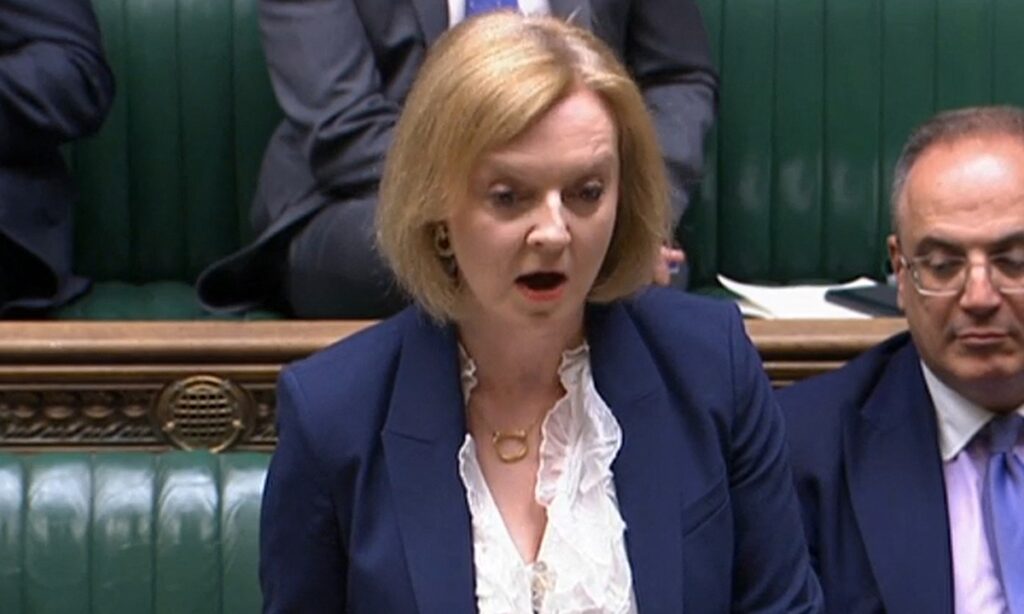The pound crisis and domestic concerns over UK Prime Minister Liz Truss’ new economic plan comprehensively embodies the UK’s present plight.
After the new UK government announced a sweeping program of tax cuts, the British pound has witnessed a sharp fall, hitting an all-time low against the US dollar. Many British media outlets expressed their concern over Truss’ fresh plan.
The front page of the Guardian published an article entitled “Sterling crisis deepens as Truss’ strategy unravels,” saying that the government was struggling to prevent a full-scale loss of financial market confidence in its economic strategy. The Financial Times (FT) led with the piece “Bank of England and Treasury fail to calm market nerves over UK finances,” saying a statement from the Bank “dashed market hopes of an emergency interest rate rise to prop up the pound.”
Britain is in trouble both at home and abroad. The pound’s reaching record-low indicates that the outside world is not optimistic about the UK’s future. With the death of Queen Elizabeth II, uncertainty hangs over Britain as well as the British Commonwealth.
Furthermore, in a bid to win more support at the next general election expected in 2024, many of the policies of Truss, a tactless prime minister, are short-sighted. Portraying herself as the political heir to former UK prime minister Margaret Thatcher, Truss now is reviving Thatcher’s 1980s experiment in “trickle-down” low-tax economics, in an attempt to revitalize the UK’s economy. It should be noticed that today Britain’s domestic situation as well as the international environment are totally different from that of Thatcher, when the UK had a big say on international affairs. As a result, it is hard for Truss to repeat Thatcher’s success in terms of the “trickle-down” low-tax economics.
Tax cuts may be conducive to relieve some burden of corporations. But in the face of the energy crisis, with the winter approaching, it remains unknown whether the UK government can guarantee domestic energy supply in addition to deal with pressure from COVID-19 and flu after cutting taxes. Such kind of policy is myopic, said Wang Yiwei, director of the Institute of International Affairs at Renmin University of China.
Truss said she is “personally a huge fan” of the US. And when defending her actions on tax cut, Truss said she took a cue from former US President Ronald Reagan. An opinion piece by the FT, which is entitled “Truss learns the hard way that Britain isn’t America,” said “Britain is in trouble because its elite is so engrossed with the US as to confuse it for their own nation … It can’t, as US Republicans sometimes do, cut taxes on the hunch that lawmakers of the future will trim public spending.”
Such view expressed many British’s aversion toward Truss’ imitation of the US, and the UK being too close to the US.
The UK is proud of itself being the birthplace of Western politics including separation of powers, and parliamentary democracy. “The British see their country as the land of US’ forefather and that the US should learn from the UK, not vice versa. It is mentally difficult for British conservatives to accept that their head of state said she is a ‘huge fan’ of the US. It can once again prove the UK’ decline,” said Wang.
Truss’ governance performance is barely satisfactory. She lacks an independent mind in both governance and diplomacy, which can be illustrated by imitating Thatcher in economy and closely following the US in diplomacy.
It has been nearly three years since the UK officially left the EU but its government is far away from finding a clear development path and comparative advantage, which sounds really frustrating from the perspective of the British. Many observers see China as a good solution to help the UK achieve the blueprint of the “Global Britain.” Consider China’s market size, without sound relations with China, it is difficult for Britain to fulfill its ambition of “Global Britain.” However, instead of fixing ties with China, Truss has blindly followed Washington’s lead in containing China and spared no effort to slander China, labeling China as a so-called threat. If this trend continues, the one who will suffer a great loss will be the UK itself and in that scenario, “Global Britain” will be nothing more than a pipe dream.
(Global Times)




